Annual Report 2022
 Art designed by Ahmed Isamaldin during a collective artistic intervention they organised during the June 2022, decolonising plenary.
Art designed by Ahmed Isamaldin during a collective artistic intervention they organised during the June 2022, decolonising plenary.

 Art designed by Ahmed Isamaldin during a collective artistic intervention they organised during the June 2022, decolonising plenary.
Art designed by Ahmed Isamaldin during a collective artistic intervention they organised during the June 2022, decolonising plenary.
2022 was simultaneously a year of transition and consolidation at DFF. We built on our successful foundation to better meet the needs of the wider digital rights community. In order to do our work effectively and coherently, we made sure to also look inwards and strengthen internal organisational culture and structures.
We had a very active year alongside our partners. Our events covered a wide range of topics, such as competition law, anti-colonial perspectives on digital technologies, access to justice in data protection, movement lawyering, and technical evidence gathering for strategic litigation. Additionally, we had two in-person plenaries as part of our decolonising process and hosted our fifth annual strategy meeting. It was an exciting and productive year, and we are eagerly anticipating what’s to come.
In our grantmaking, we passed the milestone of more than EUR 3 million distributed in grants to advance digital rights through strategic litigation since 2018. In 2022 alone we approved grants worth more than EUR 800,000 supporting 19 strategic litigation projects, to grantees located in Spain, Germany, Turkey, UK, Ireland, Italy, Netherlands, Hungary, and beyond.
Towards the end of the year we kickstarted our first-ever EU-funded project: Developing Information, Guidance, and Interconnectedness for (Charter) Rights
Integration in Strategies for Enforcement (digiRISE). This project aims to increase awareness of the potential of the EU Charter of fundamental rights in the defense and protection of digital rights, to conduct capacity building, and to strengthen the knowledge and ability of different stakeholders in enforcing digital rights using strategic litigation.
The year ended with our Board approving our new four-year Strategic Plan (2023-2026). The plan is truly a work of collaboration, co-creation, and passion. The iterative drafting process took many months and included extensive internal discussions among the staff and with our Board members, and more than fifteen external consultations with partners and allies. The new strategy completely redefines our values and theory of change and includes a host of innovative and exciting ideas that will guide our work in the years to come.
Internally, the year started with my appointment as the new Director. We then recruited our first-ever Communications Lead, who has helped us take our communications to a much higher level. We also appointed a digiRISE coordinator and had a couple of other personnel changes. For a small organisation like us these changes were significant. We also took the opportunity to act on the recommendations from external consultants to conduct a series of intense workshops on internal decolonising, aiming at exploring what decolonising means in the workplace; developing better feedback methods that consider a racial and gender lens, as well as individual preferences; anti-oppression practices; exploring our identities; and workload, capacity, and mental health. We are committed to continue on this journey. DFF’s staff, Board, partners, supporters, donors and friends are the ones who make our work possible. I am deeply grateful to them, and to all of you, for fighting for the realisation of human rights in digital spaces and in regard to technologies, and for engaging with DFF in 2022. We couldn’t do it without you.
With gratitude,
Mauricio Lazala Leibovich Executive Director
The Digital Freedom Fund (DFF) exists to support organisations working on digital rights issues in Europe to use strategic litigation to advance and protect human rights in digital spaces and reduce the negative impact of technology in the world. We were established in 2017 and have built a strong record of conscientious grantmaking, curated skill- and knowledgebuilding events, and an expanding network of partners and allies, all united in the desire to create systemic change. All our work aims to adhere to transversal values based on decolonial and anti-oppressive principles.
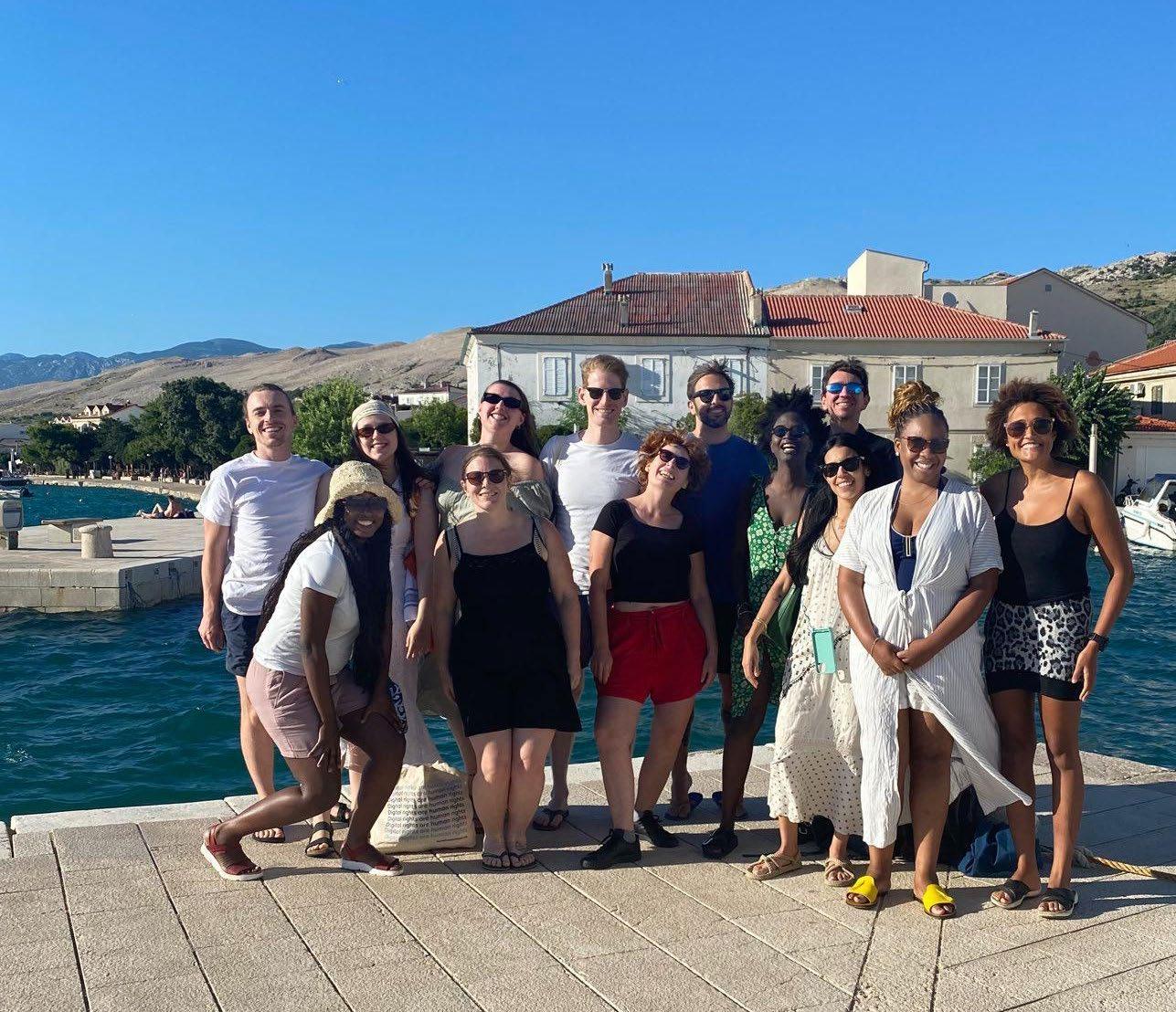

At DFF, prevalent in our focus is ensuring that our operations infrastructure safeguards the sustainability and resilience of the organisation; guarantees staff well-being, mental health and satisfaction; aligns with principles of antioppression and diversity; and enables future diversification and careful growth.











“We aim to advance and protect human rights in digital spaces, reduce the negative impact of technology in the world, and create systemic change.”
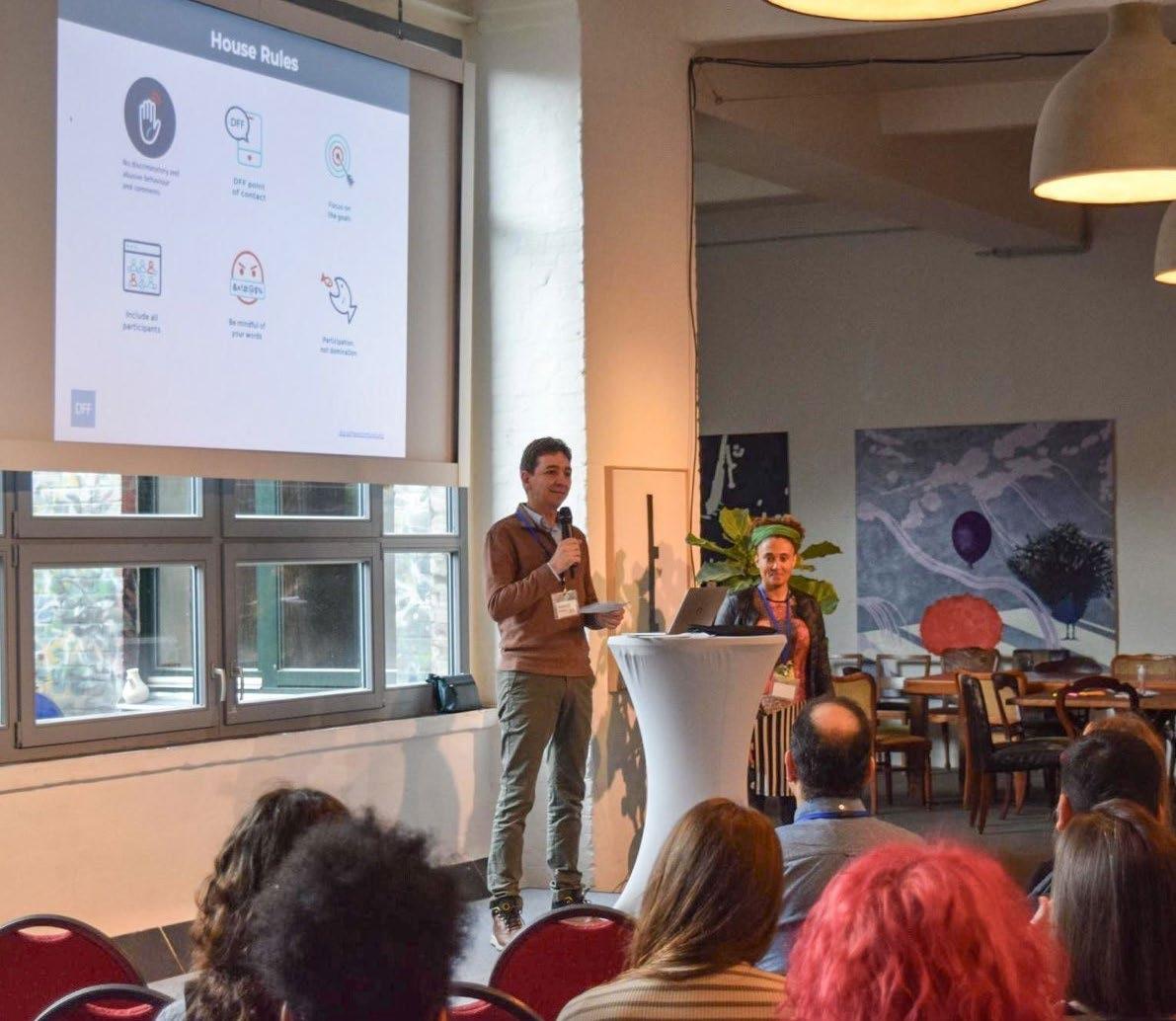
We are Committed to Human and Digital Rights
We are committed to Decolonising and anti-oppression principles
We seek to catalyse a process of structural change to decolonise the digital rights community, and to the establishment of an anti-oppressive work culture within our organisation and beyond
We seek to revise and fine-tune our activities as they are undertaken, learning from and keeping an open line of communication with the digital rights community as a core part of our work
We are committed to Iterative learning
We acknowledge that as a participant in existing societal structures, we may inadvertently contribute to harm. We continuously question our role and orient it towards reducing these harms and contribute to the advancement of the communities we aim to serve
We are committed to being Community-
We are committed to being SelfReflexive
We set our priorities based on the needs and inputs of the communities and organisations resisting digital rights harm. We also identify gaps in skills, knowledge, and strategy, and invite the digital rights community to focus on these gaps
We observe, promote and respect human and digital rights in everything that we do. We prioritise those facing the most oppression
The community develops stronger, more strategic, better informed, adequately resourced, and efficient digital rights litigation plans, representing a wider range of issues, and are better able to articulate, coordinate and implement these plans

The community becomes more resilient and stronger, aworking on digital rights issues, such as racial, social, economic, gender, LGBTQI+, disability, migrant, and environmental justice organisations
New coalitions are fostered based on anticolonial principles of equity, dignity and redistributed power dynamics
We provide funding centred on the needs of the grantee, for collective strategic actions
We support a community working on digital rights issues to develop impactful litigation plans which promote and/or defend digital rights on a range of issues and is resourced to implement them
We convene a community working on digital rights issues to discuss challenges, opportunities and potential partnerships to strategically address these issues
We support the community to share learnings, build skills, knowledge and capacity, and collectively work towards acknowledging and addressing injustice
A society in which technology and digital spaces are used justly and fairly so that all communities and individuals can fully enjoy their human rights.
Legislation, regulation, policies and practices which protect human rights in digital spaces and all that regards the use of technology is established, improved and/or enforced.
There are positive changes which yield benefits across society, but especially for the groups, communities and individuals most impacted by technological harm and digital rights violations.
Court cases led by the community obtain judgments which advance and promote digital rights.
The community develops practical and experience-based learnings and evidence to advance litigation strategies for digital rights, that apply anticolonial principles.
Human rights violations in digital spaces are increasing. The capture and commodification of data for profit, control or political propaganda exacerbates inequalities and deepens discrimination mechanisms. The use of new technologies in this context reinforces colonial dynamics of exploitation, extraction and displacement. Emerging law and policy do not sufficiently protect communities and individuals from human rights infringements in the digital context. There are inadequate legal protections to prevent (and seek accountability for) these violations. The organisations working on digital rights issues have insufficient resources and capacity and they are not collaborating with each other effectively. There is a lack of production and sharing of expertise, knowledge and partnerships which hampers the impact of strategic litigation.
Our ongoing experience working directly with the digital rights community underlines that strategic litigation is still a very important tool for advancing digital rights. However, developments in 2022 have shown that while regulations continue to be developed and implemented in Europe, tech companies and many governments are also expanding their resources and influence that when coupled with the rise of authoritarianism and populism, is leading to increased power inequality and more human rights violations. We see a need to expand our work to encompass a wider scope of organisations working towards a society in which all communities and individuals can fully enjoy their human rights in digital and non-digital spaces, and funding more deserving cases. With the support of DFF grants and our Community Strengthening and Support events, we hope that our partners will be better equipped to counter the imbalance of power with tech companies and governments.
Underpinning our work is the belief that we are stronger when we work together and that those facing the most oppression should be our priority. Our digital rights are under constant threat, but violations disproportionally affect those who are already marginalised by existing structures of oppression. At the same time, rapid technological developments and the seemingly infinite power and control of Big Tech call for new alliances, fresh thinking, and approaches that target the root causes of discrimination, exploitation and marginalisation.
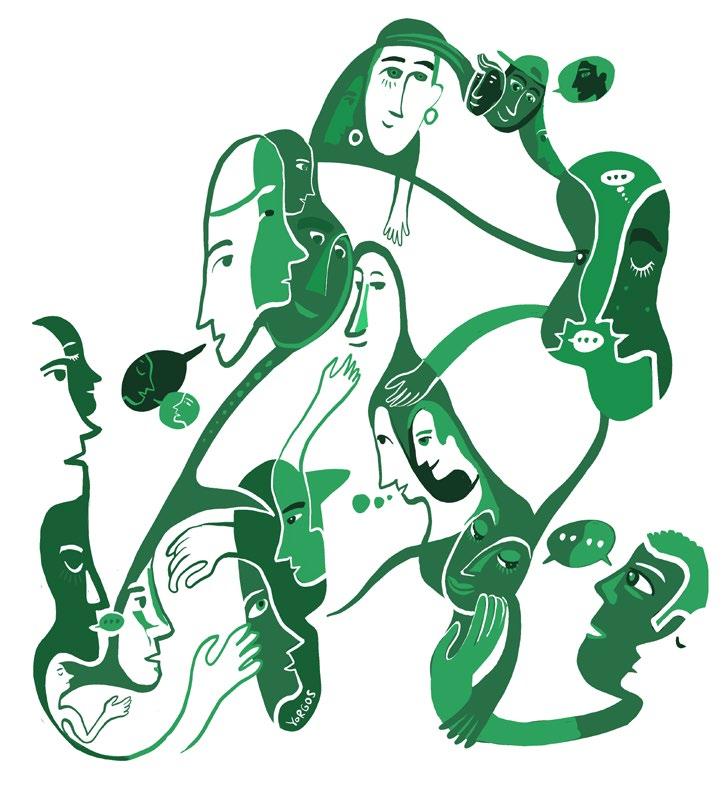
Building on discussions about the wider decolonising process for the digital rights field, in 2022 we started to look at ways that we can decolonise our own work. From January through June, all staff participated in an intense series of workshops on internal decolonising principles and practices run by expert external consultants. Although much of this work focuses on personal changes, such as learning about antidotes to white supremacy culture and building more empathetic ways of communicating, we also started to make some concrete operational changes to embed these principles in our internal culture. This includes, for example, changing our working guidelines to integrate wellbeing, mental health, and anti-oppression practices; Time-Off-In-Lieu recognition; childcare support allowance; home office allowance; etc. Working hours were reduced from 40 to 36 hours per week, and we implemented a flexible policy around working remotely.

2022 Milestones
In 2022, as well as approving grant support for 19 applications, we also took steps to revise our grantmaking to better match the needs of the digital rights community and be more accessible to all actors. Two consultants carried out a review of our current processes, interviewing grantees, community members and other funders, and producing a report with reflections and recommendations. We plan to take more steps to transform our grantmaking in 2023, which will include revisions to our processes and piloting of new grant types. We also took steps to update our case study page with new cases and case updates, with plans to complete a revision of the page in early 2023 with a more advanced and user- friendly filter and search function. For example, it will be easier to find all case studies related to a particular issue like platform accountability or mass surveillance, a particular target group like racialised communities, or a particular organisation or country.
70
in 2022 DFF made its 70th grant
3m
DFF surpassed EUR 3 million in total funding given
36
As of January 2023, 36 DFF grants have been completed, including 11 in 2022
First choose your grant type and check your eligibility online via our platform.
If your eligibility is confirmed, fill out the full application and submit by the deadline.
Litigation track support, for multiple instances
For example, a challenge all the way to the European Court of Human Rights against police use of facial recognition technology.
Your application is evaluated with the assistance of our Panel of Experts, based on which, we make a recommendation to the DFF Board.
The DFF Board makes the final decision and we notify you of the outcome.
For example, a comparative study between EU jurisdictions on which offers the best options to address a specific issue.


In 2022, we funded 19 grants worth EUR 800,000 supporting litigation and pre-litigation activities across 12 individual jurisdictions, including Czech Republic, France, Germany, Hungary, Ireland, Italy, Luxembourg, Netherlands, Norway, Spain, Turkey and the United Kingdom. Topics covered included competition law and data rights violations by gig economy companies, predictive policing, spyware, sensitive data protection and privacy violations by online platforms, hate speech fueled by algorithms, facial recognition technology, processing of sensitive medical data, inactive data protection authorities, surveillance through automated number plate recognition, blocking of websites used by queer communities, automated digital identity check services, digital attendance tracking of students, and online political advertising.
The following are ten case studies covering a selection of the activities supported in 2022.
Area
Human rights standards in the use and design of technology
Case
Case Association Taxi Project 2.0 carried out pre-litigation research to support the preparation of a complaint(s) against ride-sharing companies in Spain, such as Uber, Bolt and Cabify. They identified price patterns and correlation among the prices of the different platforms, indicating indirect fixing of prices through the algorithms, which could be a violation of competition law. Based on the results of their pre-litigation work Taxi Project are preparing a submission to the Spanish Competition Authority, aiming to establish regulations granting rights against algorithm exploitation and data abuse by urban transportation platforms in Spain.
The “Top 400” programme in Amsterdam profiles minors and young adults to predict the 400 most likely to commit serious crimes. This programme is problematic because it disproportionately targets marginalised youth based on biased criteria such as where they live and who they are friends with. There are also concerns about the invasive monitoring of people that have done nothing wrong and the sharing of data between police and health care professionals. PILP completed pre-litigation research showing that the Top 400 programme is built on surveillance, policing and stigmatisation of children and their families.
GFF has filed a constitutional complaint against a recent amendment by the German Bundestag to its telecommunication surveillance regulation (“G10”). This amendment introduces the ability for German intelligence services to surveil encrypted communication by installing malware on devices. GFF states that the new provisions also provide an incentive for agencies to acquire and keep hidden knowledge of system vulnerabilities, which they exploit to install this malware.
noyb is challenging the inactivity of the Luxembourg data protection authority (CNPD), in response to a complaint filed against Amazon back in 2019. noyb argues that the lack of follow up on the complaint entails a breach of the complainant’s personal data protection rights as well as the right to obtain a decision within a reasonable time. This case is part of wider efforts by noyb to push data protection authorities, particularly lead supervisory authorities, to act upon complaints within a defined timeframe, and to be more transparent and accountable.
Privacy First are challenging the Dutch Automatic Number Plate Recognition (ANPR) Act, which enables the Dutch police to automatically collect and store the license plate data of all vehicles in the Netherlands – including ‘no-hits’, i.e. individuals not suspected of any crime –for criminal investigation and intelligence purposes.
Privacy First argue that this practice lacks necessity and proportionality and aim to have the ANPR Act declared inoperative in the Netherlands.
IuRe is planning litigation to challenge the processing and use of sensitive personal medical data by the Czech Institute of Health Information and Statistics through the National Health Information System. IuRe believe the system is violating data protection and privacy rights, and that data.
Human rights in the use and design of technology
StraLi for Strategic Litigation (StraLi) is preparing a strategic path to challenge the use of facial recognition technology by law enforcement and judicial authorities in Italy. The planned litigation will target exemptions to a law that allows for the use of facial recognition technology in public spaces for the prevention, investigation, detection and prosecution of criminal offences.
In December 2021, the Norwegian Data Protection Authority (DPA) issued an administrative fine of NOK 65 million (around EUR 6.5 million) against dating app Grindr for disclosing personal information about users to third parties for behaviour-based marketing without a legal basis. In February 2022, Grindr lodged an appeal against the DPA’s decision. NCC together with partners such as noyb, are aiming to ensure that the original decision is upheld throughout the appeals process.
“Gig workers” are oppressed, misclassified as selfemployed and denied the right to a minimum wage, as well as freedom from discrimination and unfair dismissal. Their oppression is exacerbated by digitisation, with intensive algorithmic management and surveillance of their work. Platforms like Uber and Ola cabs have refused to make available personal data of drivers at work or to provide transparency of algorithmic management as required by law, thus preventing drivers from collectively bargaining or claiming their employment rights. Through the latest pre-litigation grant, Worker Info Exchange are developing a litigation strategy concerning automated decision making by management over gig economy workers relating to (i) work allocation based on worker profiling and automated decision making and (ii) performance management.
Online political advertising has a decisive influence on national politics, and it is thus important that citizens be allowed access to information about this advertising, such as who is paying for it and who is being targeted. But currently there is a lack of clarity about whether social media platforms fall under the scope of Freedom of Information legislation. K-Monitor are are in the pre-litigation stage getting ready for litigation seeking a court ruling to force these platforms to respond to information requests, and potentially push for new legislation.
Projects we supported that were completed in 2022
6
5
Research projects completed
1 1
2 2
Litigation instances completed Outright win Ended early
3 Three are being appealead so projects are ongoing
Partial wins Losses
2
1 Two lost instances Partial
36
DFF grants in total completed between 2018-2022
As of early 2023, 24 individual/single instance grants of DFF-supported litigation and 12 pre-litigation research grants had been completed. However, in most cases, our support does not end after the completion of one instance, or one grant. Many projects are ongoing, and we continue to support them through our litigation track support model. For instance, eight litigation projects we are supporting have received a decision in at least one instance but have been appealed and are ongoing. 11 DFF-supported litigation projects have received a final judgement and have completely ended. Of these cases, eight at least partially achieved their objectives, while three were unsuccessful. Additionally, five completed pre-litigation research support projects have then received litigation funding from us afterwards. As of January 2023, 37 DFF-supported cases and nine pre-litigation research projects are ongoing.
The stand-out impact from a case we supported in this period was a major decision by the Supreme Court of Spain in October 2022 recognising for the first time that information about abortion on the Internet is constitutionally protected by the right to information. The case had been brought by Women‘s Link on behalf of Women on Web (WOW), a non-profit organisation sharing information on safe medical abortions, challenging the 2020 government decision to block WOW’s website.
The decision also creates an important judicial precedent since, for the first time, it establishes that judicial authorisation will always be mandatory when blocking information published on the internet. The court did allow for the ongoing blocking of the part of the website that allows access to information about abortion pills, and Women’s Link plans to continue the litigation to the Constitutional Court, and then to the European Court of Human Rights to appeal this aspect of the ruling.
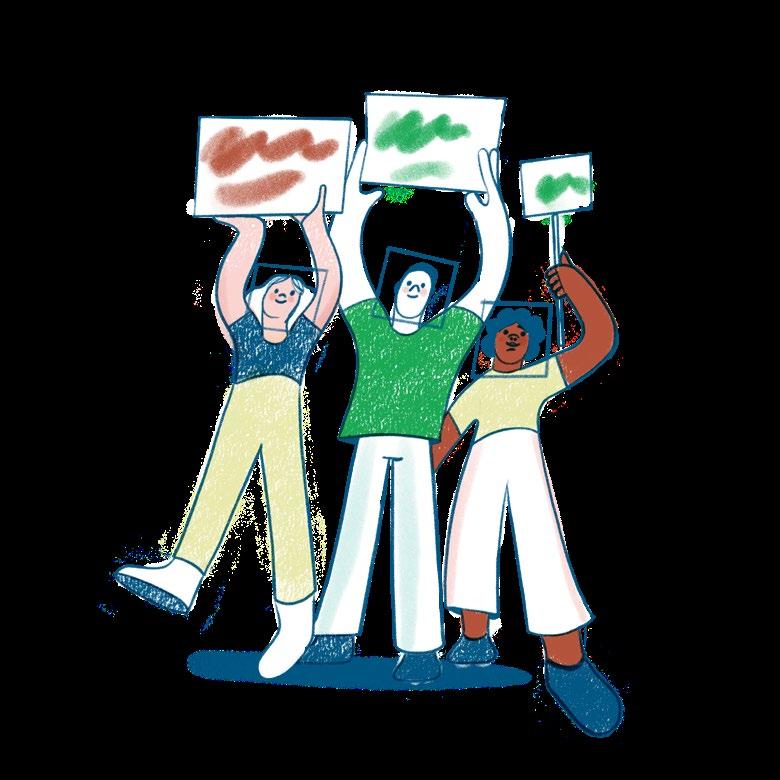

In February 2022 the Belgian Data Protection Authority ruled that the Interactive Advertising Bureau’s (IAB) cookie consent banners are illegal. This will potentially influence the whole online advertising industry. The ruling came on the back of EU-wide complaints coordinated by a range of groups and individuals including our grantees.
In December 2022, the GFF received a positive decision from an administrative court in Germany related to the EU Passenger Names Records Directive, with the court declaring mass processing of flight passengers’ data illegal. This followed the June 2022 ruling from the EU’s Court of Justice that found the directive compatible with the European Charter of Human Rights, leaving it up to domestic courts to apply domestic laws.
Research by WIE has also already informed several ongoing cases against Uber and Ola cabs, including a case in Amsterdam that we are funding in which a decision was due in 2023.

Worker Info Exchange (WIE) has started collaboration with another of our grantees, Association Taxi Project 2.0, including co-writing recommendations on the draft of the EU Platform Work Directive. Worker Info Exchange’s various litigation activities have also helped pressure Uber to make other changes that benefit worker rights. For example, Uber has now agreed on a formal protocol with WIE, which makes it much easier to submit and process subject access requests and receive data. WIE expect this can help increase the scale of their work, and support to platform workers, and they hope to leverage this to create similar protocols with other platforms.

Research by GFF, medConfidential, Global Legal Action Network, the Public Citizen Foundation and the Public Interest Litigation Project were successfully completed in 2022, with all five organisations considering litigation in the next phase.

In 2022, during the DFF team retreat, we concretely redefined and integrated the concept of “community” as a core part of our new strategy. Members of our community can encompass any individual or organisation based in Europe working in some way or another on digital rights issues, even if it is not their main area of work. We will continue engaging with a wider range of racial, social, economic, gender, LGBTQI+, disability, migrant and environmental justice organisations working on digital rights, and in doing so contribute to building a community that we can strengthen and support through our programmes.

March
Netgain Competition Law Workshops
April
Annual Strategy Meeting
We published a strategic litigation toolkit in 2022, that was produced through a collaborative process with many members of the digital rights community, and also incorporates recommendations and guidance that align with our decolonising goals.
The strategic litigation toolkit includes guidelines, expert tips, examples, case studies, and references to useful resources which can assist and guide digital rights litigators in managing their cases from conception to finalisation. It also encourages litigators to think critically about how litigation can be impactful in achieving positive societal change, emphasising that litigation is more likely to be effective if embedded in a wider strategy or movement, used in tandem with advocacy, investigation, communications, and other interventions.
June
Decolonising plenary
July
Movement Lawyering
Oct
Evidence Gathering Workshops
Nov
Community- centered advocacy and strategic litigation workshop
Dec
Access to Justice in Data Protection
Speaker Series- Another Tech is Possible?
We facilitated a workshop in March funded by Netgain, looking at how the Digital Markets Act and Digital Services Act could offer new avenues for digital rights activists and litigators to use EU competition law frameworks to challenge Big Tech. This session built on events, resources and a speaker series going back to 2019.
Our fifth annual strategy meeting took place in April 2022, held virtually for the second time. Over 50 people from a diverse range of organisations attended the meeting. As well as sessions exploring collaboration, strategies, and plans for the year to come, we also centred the meeting on restfulness, self-care, healing, and mindfulness, which most attendees highly appreciated.
We held two complementary workshops in October 2022, funded by Luminate, that brought together litigators, campaigners and technologists working on research and evidence gathering projects to look at ways to collaborate on litigation to hold Big Tech platforms accountable for rights abuses.

In December 2022, we brought participants together for a two-day event in Dublin focusing on access to justice issues in the data protection space. The workshop focused on specific GDPR enforcement issues and data protection authority inaction, as well as broader access to justice concerns around topics such as social protection and image-based sexual abuse. The event was created with input from active players in this field, and featured peer-
facilitated sessions by noyb, Irish Council for Civil Liberties, Privacy International and DATAWO.
DFF’s third Speaker Series which began in December 2022 to the fore of the following year, delved into the power of an anti-colonial lens when examining harmful tech and the states and companies who deploy it. Discover how it exacerbates racist policing, exploits workers, and devastates our environment. Watch the series for firsthand accounts of inspiring movements fighting back and building a better, more just world.
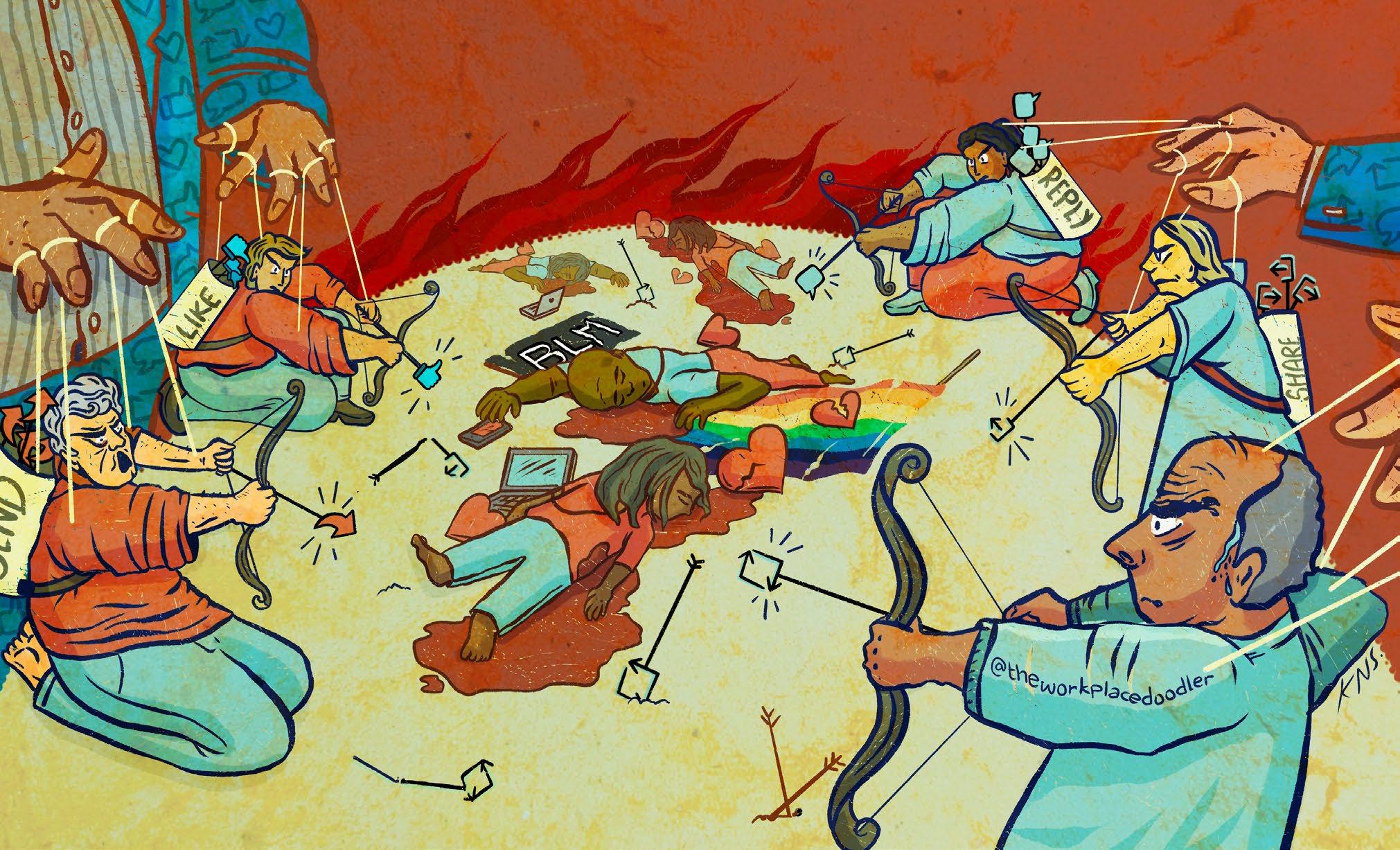
Since 2020 we have co-led and continue to actively
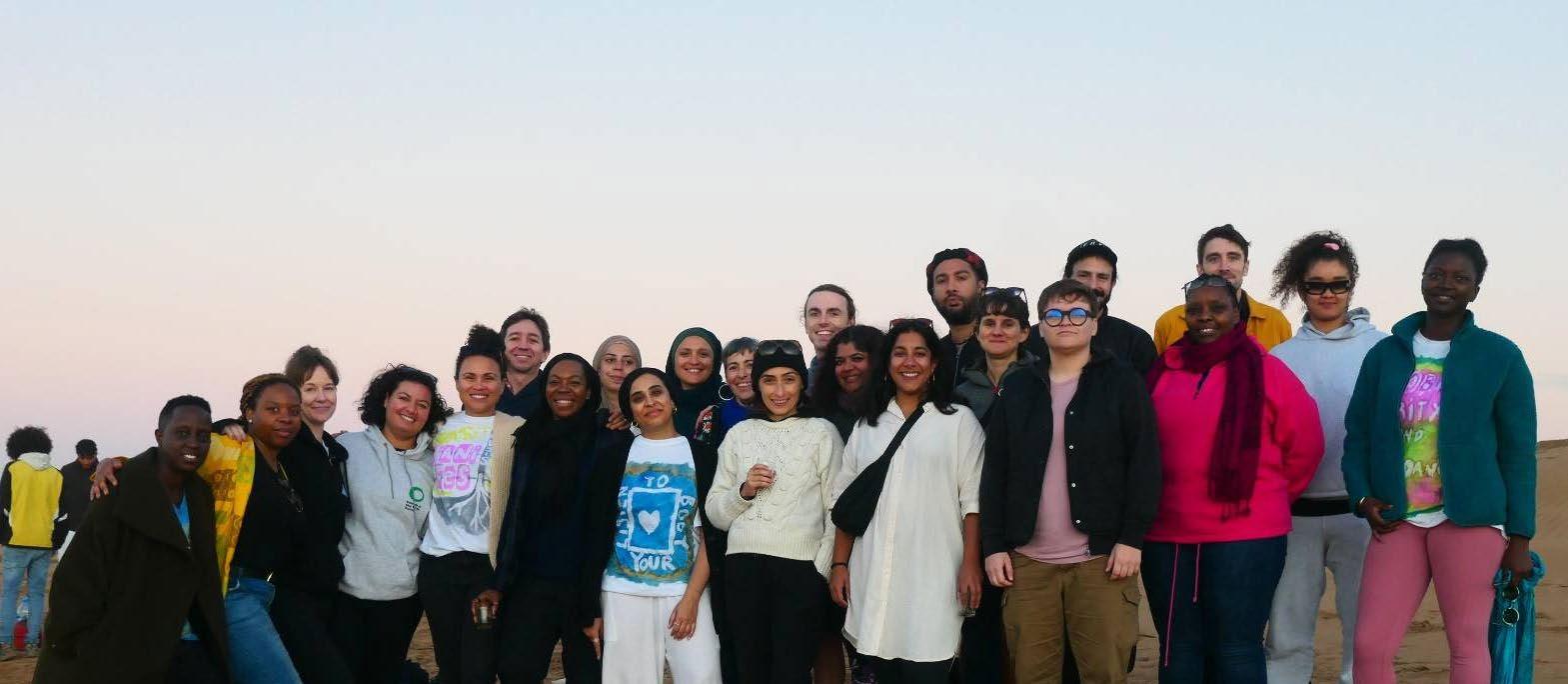
Third Plenary
Third Plenary (In Person & Online)
Working Group Sessions
Mini Plenaries
Imagining Activities
A Decolonial Tech is Possible?
Ideation and Recording Activities
Peer Learning Sessions
Visualisation of the activities for the second trimester of the Decolonising the digital rights field in Europe process.
Decolonising in Practice
Further Research Decolonial Practices and decolonial Leadership
DFF‘s first in-person event since the beginning of the pandemic took place in June, with 26 participants coming together in Italy for the third decolonising plenary. The fourth and final plenary was held in Essaouira, Morocco, at the end of November. Many of the participants
Abolitionist Tech and Visions from the Global South
The Revolution Will Not Be Funded
TraumaInformed Orginising
communicated about being excited to reconnect in person with the group and continue the work. There was a shared sense of ownership and commitment to the process as well as deep appreciation for the emerging community.

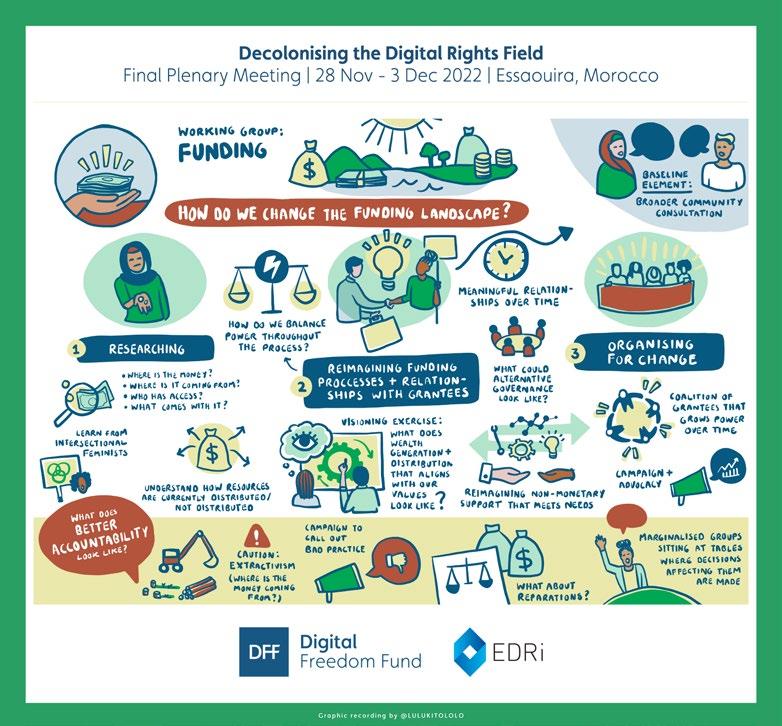
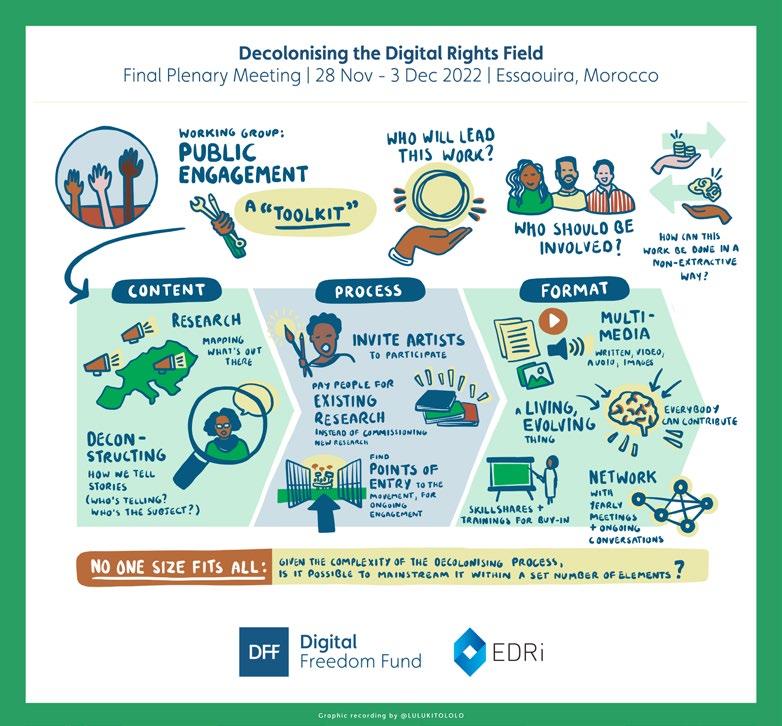

The final plenary offered a space for each group to workshop their final list of activities, explain the rationale behind it and receive feedback. It was also an opportunity
to see areas of convergence and opportunities for activities to be merged, map gaps and finetune them to ensure maximal alignment with anticolonial principles.

From March 2021 until November 2022, we designed and organised a series of seven thematic for All workshops: Talking Digital, Digital Policing policing of migration, Digital oppression at work Safety, Movement Lawyering and Community- centred Strategic Litigation and Advocacy. The workshops were organised around two streams: Building Digital Solidarity and Fighting Back. The latter stream aimed to strengthen knowledge on digital issues, as well as exploring tools to resist different digital forms of injustice. The former stream aimed to foster cooperation and collaboration around digital rights issues by working on common tools, including shared language, shared digital safety practices, and the development of strategic litigation and advocacy tools centred on their added value for the community. Following the first workshop, we published a Talking Digital toolkit where definitions of often-used but little-understood tech vocabulary can easily be found and highlighted through a racial and social justice lens.
In July, we organised a dedicated workshop in London on “movement lawyering”. This was prioritised after being one of the most popular topics at the strategy meeting in April, with many people wanting to explore further what movement lawyering means in practice and hear from those with relevant experience. The movement lawyering principles and approach aligns very closely with our decolonising goals and promotes racial and social justice.
An event on community-centred advocacy and strategic litigation followed, exploring questions around how advocacy is made for and by the impacted communities, what to consider when contemplating strategic litigation as a tool for social justice movements, how to ensure that the priorities and interests of the impacted communities are centred, and how to avoid exploitative dynamics.
“An invigorating and inspiring environment.”
“Movement lawyering is the future of lawyering.”
Movement Lawyering Workshop Feedback Survey Respondents
“Movement lawyering recognises that those whose rights are most directly impacted by the issues being considered by the court should be the ones leading and giving direction in the litigation.”
Community-centred forms of strategic litigation attempt to reconcile the process with the goal, making the case that who is involved in designing the strategy deeply determines both the goals and the means.
In this sense, community-centred strategic litigation (CCSL) is a form of strategic litigation led by the impacted communities in which the goals and the means of the strategic litigation are decided collectively, and which centres the impacted communities in all steps of the process.
Because it centres a community, community-centred strategic litigation aims at empowering its members and the organisations which defends its interests, it aims at building power within the community to enhance the capacity not only to react to and protect from current harms by the means they deem appropriate but also to imagine how to prevent those harms from reoccurring.
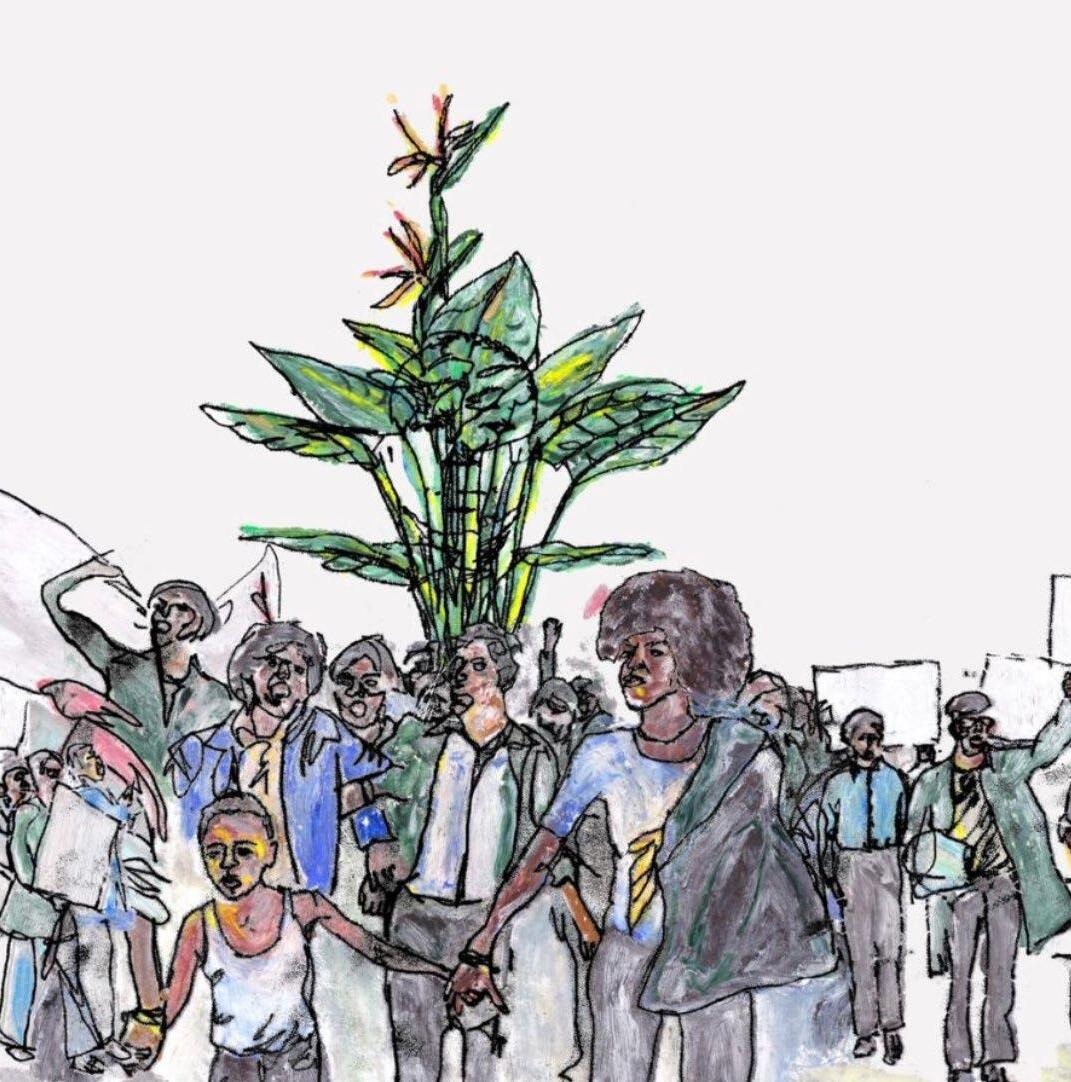
Here are some video reflections of some of our events in 2022:

Annual Strategy Meeting 2022
Access to Justice in Data Protection Workshop Dublin, Ireland
Evidence Gathering Series by Digital Freedom Fund


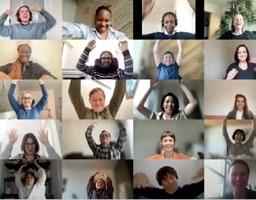
What does decolonising mean to us?

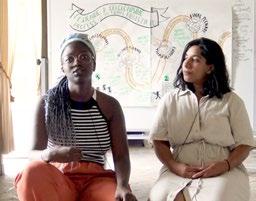
Why a decolonising process for the digital rights field?
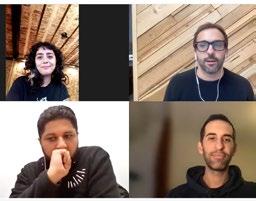
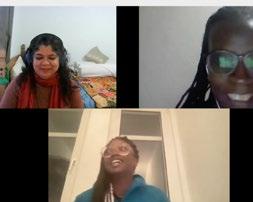
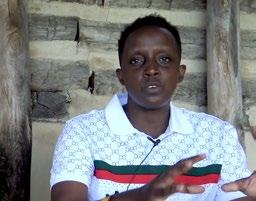
How did the decolonising process begin?
Speaker Series 2022
Another Tech is Possible?
Speaker Series 2022
Anti-colonial Tech
Speaker Series 2022
Tech Workers Movements
Speaker Series 2022
Digital Climate Justice

After a period of transition in 2021, we hit the ground running in 2022 and had an excellent financial year. The most notable achievement was a 30% expansion in direct spending on activities with only a marginal increase in operational spending. Activity spending increased across the board, but in particular for our Decolonising the Digital Rights Field and Digital Rights for All activities. This resulted in total operational spending of EUR 1.77 million (2021: EUR 1.36 million).

Grantmaking
The grantmaking budget of EUR 700,000 was fully committed to 19 projects. The proportion of organisational spending on grantmaking before financial gains totaled 36%, within the target range of 35-50% (2021: 38%).
Community Strengthening and Support (CSS)
Spending on CSS work increased in 2022 and exceeded budget projections because we returned to some inperson events. We secured additional funding allowing for further spending on the Platform Accountability Evidence Gathering, Decolonising the Digital Rights Field and Digital Rights for All projects. CSS activities accounted for 21% of total spending before financial gains and reserve allocations (2021: 12%). Even with this increase, the ratio remains within the operating ratio target of 15% to 30% of total spending.
Operations
Operating expenses increased in 2022 but were below budget due to controlled spending in IT, communications, staff costs and pro-bono legal advice. This represents measured year-on-year growth in operational spending in relation to the expansion in spending on activities and meant a significant decrease in the proportion of spending on operating expenses from 50% in 2021 to 43% in 2022.
Funding
2022 was a successful year in fundraising, with further diversification. We secured a number of important renewals from some of our long-lasting funders and added a new funder to our cohort (EU Commission), bringing the total number of active funders to 12.
43%
21%
Grantmaking
Operational Costs
36%
Community Strengthening and Support
DFF deeply thanks its funding partners: Open Society Foundations, Adessium Foundation, Luminate, Ford Foundation, Foundation Nicolas Puech, The Sigrid Rausing Trust, Stiftung Mercator, Robert Bosch Stiftung, Limelight Foundation, Internet Society Foundation, and the European Commission for their kind and generous contributions to advancing digital rights in Europe, which makes DFF’s work possible.
Thank you for sharing your work with not only us but the world.
Being an artist is often a vulnerable path. You make something so deeply personal and then present it to the world with an open heart. Not everyone is so fearless.
DFF thanks Yorgos Konstantinou, Justina Leston, Ahmed Isamaldin, Alice Z Jones, Estelle Pom, Claire Zaniolo, Kruthika NS, Lulu Kitololo and Cynthia Alonso.
The Digital Freedom Fund supports strategic litigation to advance digital rights in Europe, by applying decolonising principles to enable the digital rights community to exercise their collective rights in digital and networked spaces. Providing financial support for strategic cases, DFF is well placed to catalyse collaboration among activists, litigators, and the whole digital rights community.
Credits
All other content © Digital Freedom Fund 2022 and CC BY-SA 4.0
Graphic design
Justina Leston
Illustrations and Artwork
Ahmed Isamaldin
Cynthia Alonso
Yorgos Konstantinou
Kruthika NS
Estelle Pom and Claire Zaniolo
Alice Z Jones
Lulu Kitololo
www.digitalfreedomfund.org
info@digitalfreedomfund.org
Postal address
Digital Freedom Fund
Nieuwezijds Voorburgwal 104-108
1012 SG Amsterdam
The Netherlands